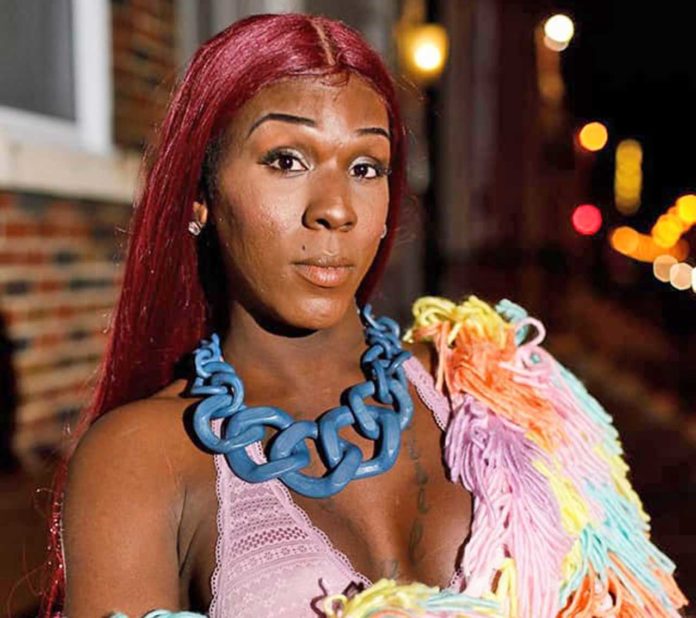“People have been donating a lot of flowers. Rem’mie would have loved all the colors,” said Alonda Talley, a current resident of Morris Home — the only recovery residence for trans and gender-nonconforming individuals and Dominique Rem’mie Fells’ last known address. Fells, a Black trans woman, was found stabbed and dismembered last Monday, June 9, on the banks of the Schuylkill River. As of Tuesday night, the Philadelphia Police issued a warrant for the arrest of Akhenaton Jones, 36, who was an acquaintance of Fells.
“During an already difficult time,” said Celena Morrison, executive director of the City’s Office of LBGT Affairs, “when many communities have been dealing with both a pandemic and national uprisings calling for racial and social justice, the murder of Dominique Rem’mie Fells was especially painful.”
Thousands gathered in Brooklyn this weekend to honor Fells and Riah Milton, another Black trans woman who was shot and killed in the process of a robbery on June 9. The Human Rights Campaign (HRC) reports that, in the United States, there have been 14 additional violent killings of trans or gender-nonconforming folks in 2020, and at least 26 deaths in 2019. These victims, said the HRC, were either killed because of an anti-transgender bias or because they were forced to live riskier lives, as trans people are disproportionately homeless, poverty-stricken, unemployed, and/or engaged in survival sex work. According to an HRC report entitled “Dismantling a Culture of Violence: Understanding Anti-Transgender Violence and Ending the Crisis,” four out of every five anti-transgender homicides are trans women of color.
“But, Rem’mie wasn’t set out to be another statistic,” said Kendell Stephens, a woman of trans experience who previously interned at Morris Home. “Rem’mie dreamed big,” said Stephens, “She was vibrant and vivacious, sweet and confidant. She was invested in her future and inspired people because of her willpower and gusto.”
Talley said everyone who knew Fells also knew that she wanted to be a fashion designer. Fells was creatively gifted and could draw just about anything, but she was usually busy sketching patterns for her future clothing lines which Talley said she wanted to both design and model someday. Talley also remembered that Fells would cut sweaters into halter tops and always wear shorts even if it was cold outside. One time, Talley recalled with laughter, Fells got a blonde wig and used a marker to color the strands blue. She even dressed a mannequin and made a shoe rack out of shoe boxes in her room at Morris Home.
Every time she closes her eyes, said Stephens, she can see Fells walking toward her — “statuesque” and “always dressed to the nines, ready to work on herself.” Stephens said Fells moved like a peacock, with color and vibrancy and life.
Stephens said that Fells was desperate to overcome her struggle with addiction and that Fells referred to her disease as a “monkey on [her] back.” Around mid-December, both Talley and Stephens recalled that Fells left the program at Morris Home and relapsed.
Talley said that Fells was very close to her family, to her mother especially. Since Fells’ death, her family asked for a modest $1,000 to help with funeral costs, and they have, as of press time, received over $122,000 in donations.
Erin Grant and Kris Keen also launched a GoFundMe campaign to raise money for Morris Home; this campaign has since received over $128,000 of a $150,000 goal. Grant and Keen’s campaign cites that it is “coordinating directly with” Morris Home and funds will be “given directly to staff and residents.”
Talley told PGN that Morris Home always felt like a “safe place” and that she wouldn’t choose anywhere else to recover.
In a Facebook post, Stephens said: “Every dollar of that money should fund the educational pursuits of Morris Home residents, not Morris Home’s operating costs,” adding, “a portion of that money should help residents pay for items they need to feel validated.”
Morris Home was contacted for a statement but was unable to provide one by press time.
This Sunday, Morrison organized a grief session intentionally structured to center the experiences of Black LGBTQ members and other people of color in honor of Fells. The Office of LGBT Affairs partnered with councilors and facilitators from the Therapy Center of Philadelphia, Department of Behavioral Health, the Intellectual disAbility Services, the City’s Office of Faith-Based and Interfaith Affairs, and the William Way LGBT Community Center.
“It is important that we make a commitment to hold space for collective grief and healing when these tragedies occur,” said Morrison.
For her part, Stephens said she is still fearful that additional violence will be perpetrated against the Black trans community.
“We’re hearing a lot of chanting and screaming that trans lives matter,” said Stephens, “This would be the perfect time for law enforcement to validate that. I really hope law enforcement is moving forward with all of their might because the sheer brutality of this crime is absolutely frightening.”
